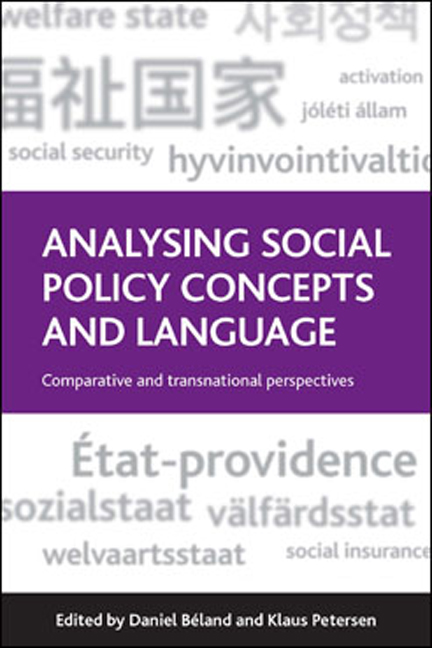Book contents
- Frontmatter
- Contents
- List of figures and tables
- Acknowledgement
- Notes on contributors
- Introduction: social policy concepts and language
- one Social policy language in Denmark and Sweden
- two The changing language of social policy in Hungary and Polan
- three Languages of ‘social policy’ at ‘the EU level’
- four The OECD's search for a new social policy language: from welfare state to active society
- five The discursive power of international organisations: social policy language and concepts in the World Bank and the International Monetary Fund
- six Original and imitated or elusive and limited? Towards a genealogy of the welfare state idea in Britain
- seven Social policy concepts and language in France
- eight The language of social politics in Finland
- nine Germany: constructing the ‘win-win’ society
- ten Conceptual development of welfare and social policy in Japan
- eleven Transition to the ‘universal’ welfare state: the changing meaning of ‘welfare state’ in Korea
- twelve The Dutch ‘caring state’
- thirteen Panacea, problem or perish: social policy language in New Zealand
- fourteen Evolving social policy languages in Spain: what did democracy and EU membership change?
- fifteen Social policy language in the United States
- Conclusion: comparative perspectives on social policy language
- Index
fifteen - Social policy language in the United States
Published online by Cambridge University Press: 04 March 2022
- Frontmatter
- Contents
- List of figures and tables
- Acknowledgement
- Notes on contributors
- Introduction: social policy concepts and language
- one Social policy language in Denmark and Sweden
- two The changing language of social policy in Hungary and Polan
- three Languages of ‘social policy’ at ‘the EU level’
- four The OECD's search for a new social policy language: from welfare state to active society
- five The discursive power of international organisations: social policy language and concepts in the World Bank and the International Monetary Fund
- six Original and imitated or elusive and limited? Towards a genealogy of the welfare state idea in Britain
- seven Social policy concepts and language in France
- eight The language of social politics in Finland
- nine Germany: constructing the ‘win-win’ society
- ten Conceptual development of welfare and social policy in Japan
- eleven Transition to the ‘universal’ welfare state: the changing meaning of ‘welfare state’ in Korea
- twelve The Dutch ‘caring state’
- thirteen Panacea, problem or perish: social policy language in New Zealand
- fourteen Evolving social policy languages in Spain: what did democracy and EU membership change?
- fifteen Social policy language in the United States
- Conclusion: comparative perspectives on social policy language
- Index
Summary
Policy discourse in the United States (US) has drawn on languages about labour, citizenship, and family. Beyond the specifications of formal citizenship (birth in the US, naturalisation procedures, freedom and unfreedom, voting rights), there is a language that shapes understandings of citizenship – rights and obligations, membership or inclusion, and individuals’ relationship to the state. From the mid-19th century, industrial capitalism sparked mass migration and immigration, intensive urbanisation, wage work, and the lack of work. The rapidly changing nature of American democracy, historian Michael Katz noted, also brought with it new questions about who merited help and what the limits of social obligation would be (Katz, 2001: 341). The terms and concepts used became a constitutive element in US social policy language.
Yet social policy is also a story of contestation and, in this respect, language and discourse matter. ‘The substance of American politics,’ finds Gary Gerstle, ‘changed dramatically over time as different groups gained and then lost control of [an articulated political] language …’ (Gerstle, 1989: 9). The development of US social policy language was not only about ideology and party politics. First, since the late 19th century, there has been a persistent tension between the charity reform conception of the ‘deserving’ and the ‘undeserving’ and the labour/industrial reformers’ concerns about the social and health hazards of industrialism and protecting the wage earner and wage income.
Bridging family and market, the language of social policy reflected (and indeed intended to shape) the expected gender roles of workers, nonworkers/dependants, and citizens. The Progressive Era (1880s–1910s) rhetoric of the family wage for a male breadwinner seeped into all policy language. From the incipient moments of industrial era social policy, welfare advocates sought to separate motherhood from ‘breadwinning’. Public relief was supposed to ‘honour motherhood’ and support it; yet in every era, there has been a resentment that poor people were not seeking and maintaining employment in the paid labour force.
Questions of citizenship related to race and immigration were ever present. How did the language of social policy reconfigure citizenship to include those outside its boundaries (women, African-Americans, immigrants), and by the late 20th century, to exclude others and thereby reconfigure citizenship once again?
- Type
- Chapter
- Information
- Analysing Social Policy Concepts and LanguageComparative and Transnational Perspectives, pp. 277 - 296Publisher: Bristol University PressPrint publication year: 2014



